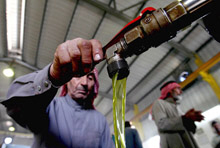
Typical street scene in Santa Ana, El Salvador. (Photo: iStock)
IMF Survey: Jordan Gets $2.0 Billion IMF Loan to Support Economy
August 3, 2012
- Country hit hard by adverse external shocks, affecting energy imports, tourism, remittances, and foreign investment
- Jordan’s program designed to address these shocks
- While protecting the vulnerable and fostering high and inclusive growth
The IMF Executive Board has approved a loan for Jordan to give the country time to correct budgetary and balance of payments imbalances while maintaining social stability.

Pressing olive oil in a Jordanian factory: Jordan is working to improve the business climate, address skills mismatches, and encourage investment (photo: Abu Ghosh/Sipa
MIDDLE EAST
Jordan, facing a series of economic shocks that have hurt energy imports, tourism, remittances, and foreign investment, has drawn up a national program designed to address its fiscal and external imbalances.
The IMF Executive Board approved a 36-month Stand-by Arrangement for Jordan amounting to about $2.05 billion, subject to quarterly reviews.
Kristina Kostial, the IMF mission chief to Jordan, explained to IMF Survey magazine the underlying reasons for the loan and discusses the overall economic outlook for the Middle East country, which has a population of about 6.5 million.
IMF Survey: Why does Jordan need IMF assistance?
Kostial: The Jordanian authorities plan an ambitious fiscal consolidation to reduce public sector financing needs, and lower public debt, which is carefully balanced against the risk of a recession and social acceptance.
The loan will provide the necessary liquidity to help Jordan get through a difficult period and make adjustments gradually.
IMF Survey: What put the economy under pressure?
Kostial: Jordan was hit by a series of external shocks in the past year. Repeated sabotage of the Arab Gas Pipeline in the Sinai Peninsula reduced the average daily flows of natural gas from Egypt. This necessitated an increase in imports of expensive fuel products for electricity generation while oil prices were high.
At the same time, regional tensions adversely affected tourism, remittances, and foreign direct investment. As a result, growth slowed significantly, investor confidence weakened, and the external current account deficit (including grants) widened to 12 percent of GDP in 2011 from 7 percent in 2010.
With the help of exceptionally large grants, fiscal policy accommodated the social impact of these shocks in 2011 and the authorities focused their attention on social policies, increasing commodity subsidies, other social spending, and also wages. Together with a weakening in domestic revenue, these measures raised the primary fiscal deficit (excluding grants) to 9.6 percent of GDP in 2011.
Expensive fuel imports also caused losses of the publicly owned National Electric Power Company (NEPCO) to increase to 4.9 percent of GDP in 2011 from 0.8 percent of GDP in 2010.
IMF Survey: How will the program, supported by the IMF, change things?
Kostial: The authorities’ program is designed to address the fiscal and external imbalances. The program would provide the authorities with a framework to achieve a gradual fiscal consolidation.
The deficits of the central government and NEPCO (as well as other loss-making public agencies) will be reduced in order to return public debt to a sustainable path. To a large extent, this will hinge on the success of Jordan’s strategy to diversify its energy sources and move electricity generation back to cost-recovery levels by establishing transparent and sustainable energy prices, pursued with assistance from the World Bank.
There is substantial scope for increasing tax revenue and improving tax administration. Tax revenue declined by five percent of GDP since 2007. Though this reflects to some extent a weakening of the economy, the main contributors were tax policy changes and weak administration.
Importantly, the program will help the government to make policies more pro-poor. Better-off households currently benefit from generalized subsidies, at the expense of the larger part of the population. Thanks to the reforms supported by the program, these households will now be asked to pay a fair price for some goods and services, allowing the social safety net to be better targeted at those who are in real need.
IMF Survey: What are the country’s growth prospects?
Kostial: Real GDP growth was 3 percent year-on-year in the first quarter of 2012, and is forecast to be at the same level for the whole year, supported in part by a recovery in remittances and a rebound in tourism receipts. Over the medium term, economic activity would gradually gain momentum with growth reaching 4.5 percent.
This would reflect implementation of structural reforms to improve the business environment, address skills mismatches, enhance labor market flexibility, and foster competitiveness.
IMF Survey: With youth unemployment at over 30 percent, what can the country do about jobs?
Kostial: Structural policies will focus on supporting growth and employment. Although Jordan compares favorably with other countries in the region on governance and business environment indicators, improvement has been slow, and firms continue to identify problems in the areas of tax policy and tax administration as major constraints to doing business.
Fiscal reforms will aim to reverse the decline in tax revenue and reduce expenditure toward making the private sector the driving force for growth and employment. The authorities will step up ongoing efforts to both enhance the business investment framework in favor of job-creating activities, and increase trade openness. Jordan has negotiated several free trade agreements in recent years. Negotiations with the European Union and Latin American countries as well as enhancing linkages with the Gulf hold the potential for further enhancing trade and economic integration.
The authorities will also step up efforts to address skills mismatches, a key factor behind the country’s high unemployment rate. Jordan already has promising initiatives that align education curricula with private sector needs, and training programs that equip the unemployed with skills demanded in the modern market place. Scaling up and replicating such initiatives and programs will go a long way to reducing unemployment.


